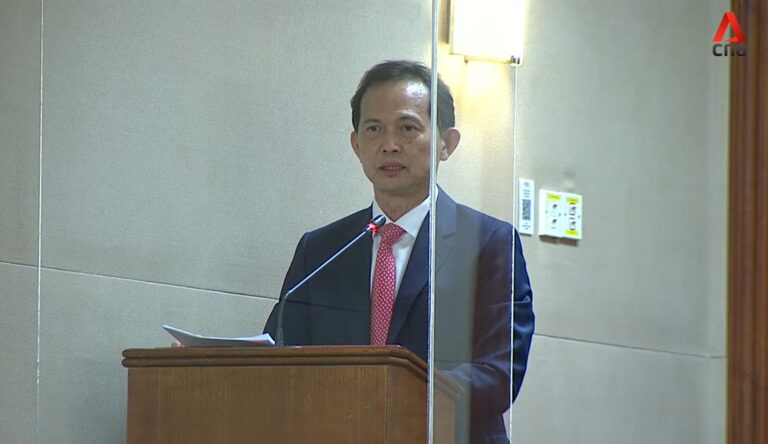Mr Leong Mun Wai rose to speak in Parliament in response to the Significant Infrastructure Government Loan or SINGA Bill. This speech was given on 10th May 2021.
The Video for the Speech can be viewed below: (Video Credit: MCI (Ministry of Communication & Information))
1. Mr Speaker, Sir, I support the Significant Infrastructure Government Loan Bill or the SINGA Bill in short because it can improve the financial efficiency and fiscal accountability of our public finances.
2. However, the SINGA Bill is no indication that the government is short of funds for national development. Today, the total financial assets owned by our country have reached $1.35 trillion by end March 2020. And despite the drawdown for the five Covid-19 supplementary budgets, our total financial assets are probably still growing because large capital inflows should have allowed MAS to accumulate more foreign currency assets in order to keep the Singapore Dollar within its policy band.
3. Even without touching the principal of the reserves, the Net Investment Return of about $40 billion a year from the reserves is enough to fund the infrastructural projects and social spending increases especially those in the healthcare area into the foreseeable future. Hence SINGA is just an additional financing scheme and not an absolutely necessary funding source.
4. The Government’s narrative about inter-generational equity is also not an accurate description of the purpose of the SINGA scheme. Since there is no lack of fiscal resources, inter-generational equity can be achieved as long as the Government allocate the resources accordingly. There is no need to borrow to achieve inter-generational equity.
5. However, the Government’s mention of inter-generational equity for the first time is heartening and I hope it will use it as a guiding principle from now on.
6. Up till now, the Government has always frontloaded all the infrastructural costs to the current generation of Singaporeans and at the same time, parked a disproportionate amount of current fiscal resources into the national reserves.
7. In addition, the social security costs, namely retirement and healthcare costs, of the Singaporeans are all self-funded by themselves without burdening the future generations. This is unlike the social systems in many developed countries like Japan where a major part of the taxes collected from the current working population is used to support the retirement and healthcare spending of the older retiree generation.
8. As a result, the current generation in Singapore has to shoulder a disproportionate amount of the infrastructure and social security costs and has to struggle with a lower level of disposable income giving rise to the phenomenon popularized by Jack Neo’s movie, “Money No Enough”.
9. So there is an urgent need to address this inter-generational inequity. However, SINGA is not necessarily the best way to achieve that. Rather, as I have said at the start, I support the SINGA scheme for better financial efficiency and fiscal accountability in the public finances.
10. For better financial efficiency, I would expect the GIC/MAS to generate a higher return of at least 2% more than the borrowing cost of the SINGA loans.
11. Unless the GIC/MAS can consistently earn a positive spread over the borrowing costs of the SINGA loans, there is no reason to borrow the SINGA loans and not make use of our current resources to fund our infrastructure projects.
12. The SINGA-loans should be issued as Singapore dollar-denominated securities to reduce foreign exchange exposure and to broaden and deepen our bond markets. It will be a big step forward for our local bond markets if the Government can issue Singapore Government Securities (or bonds) with longer maturities like 20 years and 30 years.
13. For better fiscal accountability, I would expect to see the pre-investment feasibility studies for the SINGA projects to be subject to public consultation so that we can tap the collective wisdom of Singaporeans and not only be guided by the experts engaged by the Government. Regular progress reports of SINGA projects should also be submitted to Parliament for scrutiny.
14. Mr Speaker, in Mandarin please.
15. SINGA法案不代表我国缺乏财政资源。目前,截止2020年3月底,我国拥有的金融资产总额已经达到1万3千五百亿新加坡元。 尽管支付了应对新冠疫情的五个补充预算,我们的金融资产总额可能仍在增长,因为在大量的资本流入下,新加坡金融管理局为了不让新加坡元汇率升值超过政策允许范围,必须选择性吸纳外汇资产。
16. 即使不动用储备金的本金,储备金每年约400亿新加坡元的净投资回报收入足以在可预见的未来,资助基础设施项目和社会保障支出的增加,尤其是在医疗保健领域。 因此,SINGA只是一个额外的措施,不是不可缺的资金渠道。
17. 因为我们拥有足够的资源,我们也不需要SINGA来确保代际间的公平(就是说这一代人跟另一代的人之间如何公平分配国家资源)。只要政府认识到国家储备的巨大规模和持续增长,已经为我们的后代提供了强大的安全网, 现在是我们为这一代人做更多事情的时候就行了。
18. 我支持SINGA法案更因为它能够提高金融效率和加强财政责任制。 金融效率是指如果我们从储备赚取的回报比在国际市场借贷的利息高,在投资重大基础项目时,我们就应该不动用我们的储备,在国际金融市场借贷会比较划算。SINGA就是让政府多了这个选择。
19. 我国目前虽然发行了七千亿新加坡元的国债和国库券,但严格上来说,这都不是债务,因为这七千亿都通过新加坡政府投资公司转投资到其他外国的金融资产。只有SINGA贷款将成为我国名副其实的债务,因为贷款将是投入我国的重大基础项目。因此,我们希望政府可以加强对SINGA贷款的责任制,定期向国会汇报有关项目的进展。
20. Mr Speaker, with no real lack of fiscal resources, and SINGA as an additional funding source, the PSP calls on the Government to review our long term fiscal plan and allocate more funds to alleviate the financial pressures of our middle-class Singaporeans and help them improve the quality of life.
21. This is necessary because the future of our country depends on a resilient Singaporean Core of skilled workers and motivated entrepreneurs.
22. Mr Speaker, I support the motion.

